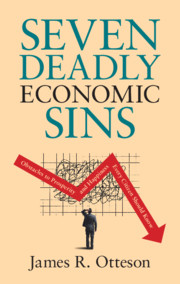Book contents
- Seven Deadly Economic Sins
- Seven Deadly Economic Sins
- Copyright page
- Dedication
- Contents
- Preface
- Introduction
- 1 Wealth Is Positive-Sum
- 2 Good Is Not Good Enough
- 3 There Is No Great Mind
- 4 Progress Is Not Inevitable
- 5 Economics and/or Morality
- 6 Equality of What?
- 7 Markets Are Not Perfect
- Conclusion
- Postscript
- References and Further Reading
- Acknowledgments
- Index
3 - There Is No Great Mind
Published online by Cambridge University Press: 09 April 2021
- Seven Deadly Economic Sins
- Seven Deadly Economic Sins
- Copyright page
- Dedication
- Contents
- Preface
- Introduction
- 1 Wealth Is Positive-Sum
- 2 Good Is Not Good Enough
- 3 There Is No Great Mind
- 4 Progress Is Not Inevitable
- 5 Economics and/or Morality
- 6 Equality of What?
- 7 Markets Are Not Perfect
- Conclusion
- Postscript
- References and Further Reading
- Acknowledgments
- Index
Summary
In Chapter 2 we discussed the “Local Knowledge Argument,” or LKA, which claims that, because individuals are in possession of detailed knowledge about their own localized situations, they are typically better positioned to make decisions about how to allocate their own resources than are third parties. This chapter looks at a related claim, in the form of what I will call the “Great Mind Fallacy,” or GMF. The GMF has two aspects. Its first aspect is to believe that there is some person or group of people who possesses enough information, and is endowed with sufficiently superior character, that we can safely entrust with the authority of crafting policy for citizens. Its second aspect is to endorse public policy that could succeed only if such people were in charge of administering the agencies and mechanisms required to effectuate the beneficial results we hope for from them.
- Type
- Chapter
- Information
- Seven Deadly Economic SinsObstacles to Prosperity and Happiness Every Citizen Should Know, pp. 98 - 120Publisher: Cambridge University PressPrint publication year: 2021

